1980s
Prometheus’s Garden
The creator's Wikipedia page.
Posted By: Paul - Tue Jul 16, 2019 -
Comments (0)
Category: Beauty, Ugliness and Other Aesthetic Issues, History, Surrealism, Stop-motion Animation, Bohemians, Beatniks, Hippies and Slackers, Psychedelic, 1980s
Signs of Health
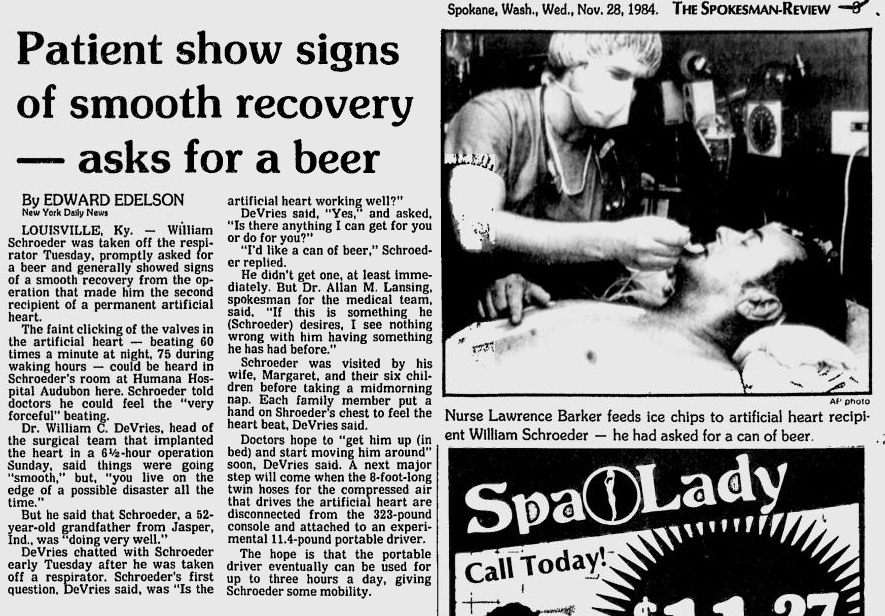
Alas, this positive sign was not an accurate forecast of the fate of William Schroeder.
Article source.
Posted By: Paul - Wed Jul 10, 2019 -
Comments (2)
Category: Body, Death, Health, Surgery, 1980s, Alcohol
The Lettuce Seed Diet
How it works: You don't eat the lettuce seeds. You stick them in your ears. Your appetite will supposedly disappear.
Los Angeles Times - Aug 29, 1988
Posted By: Alex - Sat Jun 22, 2019 -
Comments (0)
Category: 1980s, Dieting and Weight Loss
Bic Perfume
Bic is known as a maker of disposable lighters, pens, and razors. But back in 1989, the company decided it could extend its brand to French perfume. So, it debuted Parfum Bic. Syndicated columnist Rick Ratliff (Detroit Free Press - Mar 27, 1989) explained the reasoning behind the product:If it's gamble had succeeded, the Bic executives would have looked like marketing geniuses. But of course, Parfum Bic didn't succeed. Within several years, it had disappeared from shelves.
If you're curious to try it, you can pick some up on eBay for about $50.

Posted By: Alex - Tue Jun 11, 2019 -
Comments (1)
Category: 1980s, Perfume and Cologne and Other Scents
No Frills Books
In 1981, Jove Publishing debuted a “No Frills” series of books. This consisted of four books, each of which was supposed to represent a generic version of a genre (science fiction, western, mystery, and romance). Each book featured a generic cover, styled after the generic packaging for foods.And to complete their genericness, the names of the authors weren't revealed. But the Internet, of course, has subsequently tracked down who they were. As posted on Bill Crider's blog:
Mystery was written by Clark Dimond, a men's mag editor/writer who also wrote for comics.
The Romance was written by Judy Coyne (former Glamour mag editor) nee Wederholt
The SF was written by John Silbersack, SF editor and now an agent.
The Western was by Vic Milan (SF author)
We were working on a No-Frills Besteller (by me) and A No-Frills movie (by film critic David Ansen) when the series was dropped.
My partner selling the series was Lou Rosetto who went on to found WIRED magazine.

So what were the plots of these 'generic' novels? Here are some summaries I was able to find online:
Science Fiction (via Goodreads)
"A space cadet is called to the commander's office at the moon academy. His father is the lone known survivor of the Pluto colony, and asks for his son to join him in the search for what happened. They assemble a crew and blast off to Pluto, where they stumble upon few clues but several surprises."
Western (via Goodreads)
"It begins when Kid Smith arrives in town and almost immediately finds himself in a bar room brawl. He’s soon menaced by the town’s two factions. Those wearing black hats are led by a corrupt judge and those wearing white hats are led ….by a corrupt mayor. Both want their hands on the widow West’s land but Smith has taken a shine to her and vows to protect her and her property from the two no-good skunks and their henchmen."
Romance (via NY Times)
'''Romance' is complete with everything the cover claims - a kiss, a promise, a misunderstanding, another kiss, a happy ending -plus an alarming trial marriage condoned, nay, arranged by the Mother Superior of a Virginia hunt-country convent."
Mystery (via Bill Crider)
"The story itself is pure pulp, with corpses piling up at an amazing rate. The unnamed first-person private-eye narrator is given a mysterious cassette tape. Someone's killing to get it because although to the p. i. it sounds like a song, it has the power to cloud most men's minds. Most women's, too. Whoever has the tape can control the world."
Posted By: Alex - Mon Jun 10, 2019 -
Comments (2)
Category: Literature, Books, 1980s
“It will never become obsolete”
Atari ad from 1980.Technology companies should probably never claim that their products will never become obsolete.
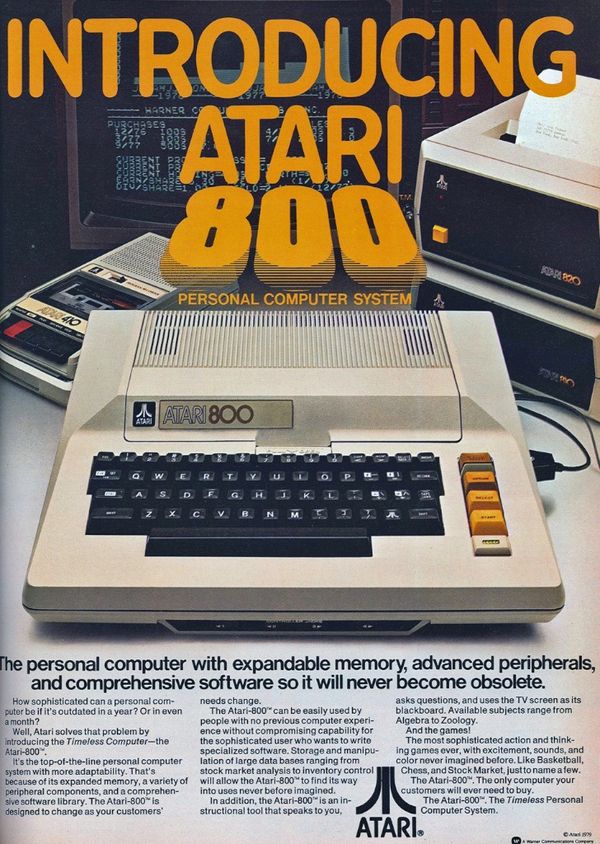
via Book of Joe
Posted By: Alex - Wed May 01, 2019 -
Comments (1)
Category: Technology, Computers, Advertising, 1980s
How to become Rich ‘N Famous
Change your name, of course.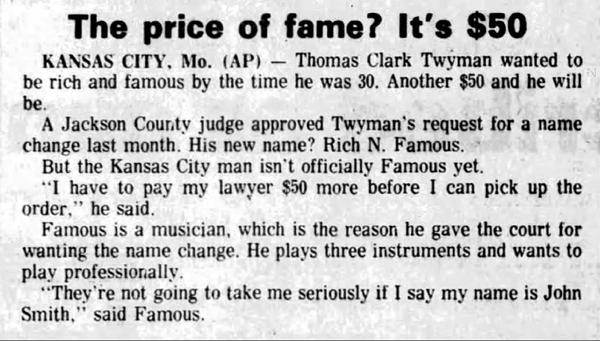
Mason City Globe-Gazette - Mar 31, 1981
As far as I can tell, Thomas Clark Twyman never did live up to his changed name. Actually, it’s not even an original gag. I found several musicians (such as the one below, from Australia) calling themselves Rich N. Famous.
Posted By: Alex - Tue Apr 09, 2019 -
Comments (0)
Category: Odd Names, 1980s
The Ohwadas and their Tattoos
An instance of the Formerly Weird becoming No Longer Weird.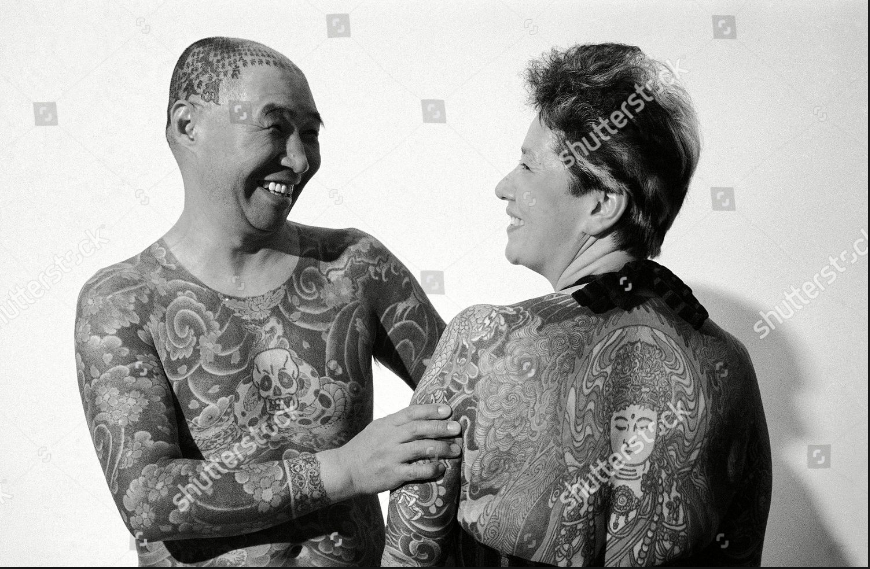

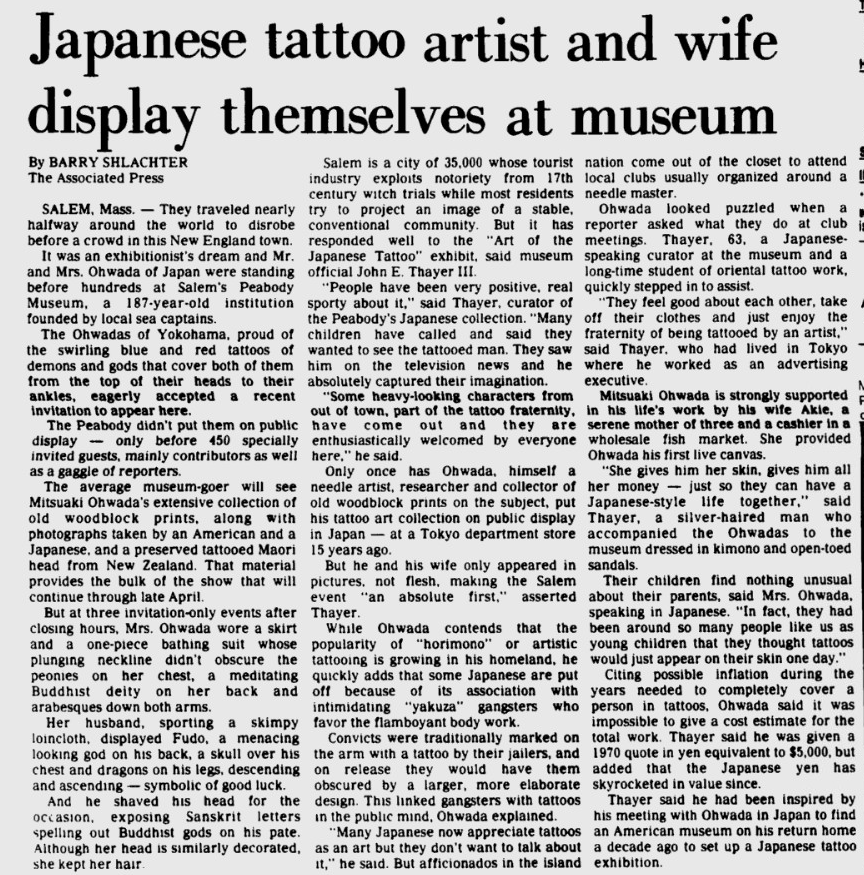
Original article here.
More pics here.
Posted By: Paul - Tue Apr 09, 2019 -
Comments (1)
Category: Art, Eccentrics, Museums, Foreign Customs, 1980s, Asia
The Seat That Burns
Concerned by an increasing number of attacks on cab drivers, Parisian taxi drivers in 1987 began outfitting their cars with a device called "le siege qui brule" ('the seat that burns'), which could electrify unruly passengers with 52,000 volts.As far as I can tell, the devices were outlawed a few months after their introduction.


Hazleton Standard-Speaker - Oct 23, 1987
Posted By: Alex - Mon Mar 18, 2019 -
Comments (3)
Category: Crime, Motor Vehicles, 1980s
Dr. John Bongiovanni, the blind surgeon
So, how many decisions during surgery don't require eyesight?

Philadelphia Daily News - Mar 2, 1984

Rochester Democrat and Chronicle - Aug 26, 1984
Posted By: Alex - Sat Mar 16, 2019 -
Comments (7)
Category: Surgery, 1980s, Eyes and Vision

| Who We Are |
|---|
| Alex Boese Alex is the creator and curator of the Museum of Hoaxes. He's also the author of various weird, non-fiction, science-themed books such as Elephants on Acid and Psychedelic Apes. Paul Di Filippo Paul has been paid to put weird ideas into fictional form for over thirty years, in his career as a noted science fiction writer. He has recently begun blogging on many curious topics with three fellow writers at The Inferior 4+1. Contact Us |




